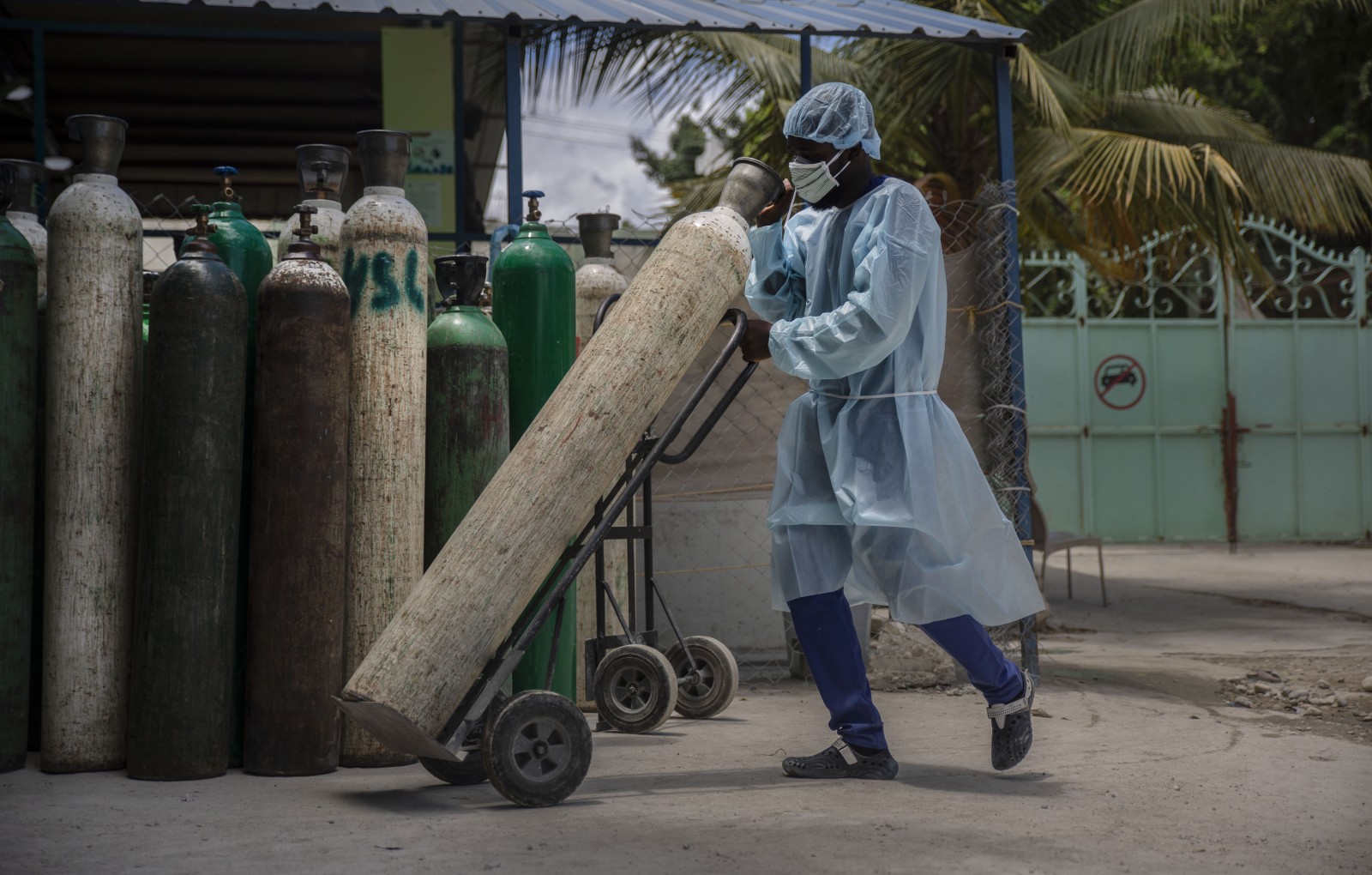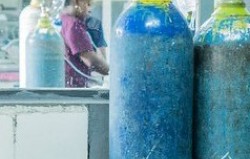Global oxygen suppliers commit to closing oxygen gaps in low- and middle-income countries
The announcement comes as many countries face surges in demand for oxygen due to COVID-19.
Almost half of hospitals in LMICs have an inconsistent supply of medical oxygen or lack it entirely.
New agreements with liquid oxygen manufacturers have the potential to prevent another wave of oxygen-related deaths.

Chronic oxygen shortages made worse by the pandemic
Oxygen is critical in the treatment of pneumonia, which claims the lives of more than 672,000 children under 5 every year. The COVID-19 pandemic has exacerbated an already dire situation, driving the need for medical oxygen in low- and middle-income countries (LMICs) to approximately 15 million cubic meters per day. In a milestone agreement brokered by Unitaid and CHAI under the Access to COVID-19 Tools Accelerator (ACT-A) Oxygen Emergency Taskforce, two of the world's largest medical oxygen companies, Air Liquide and Linde, have now committed to working with global health partners from the ACT-A to facilitate equitable access to oxygen in a number of priority countries.
The ACT-A Oxygen Emergency Taskforce partners include Unitaid, Wellcome, WHO (and the biomedical consortium it coordinates), Unicef, The Global Fund, the World Bank, UNOPS, the Every Breath Counts coalition, CHAI, PATH, Save the Children, The Bill and Melinda Gates Foundation and the Access to Medicine Foundation.
Such agreements have the potential to unlock supplies of liquid oxygen for people living in LMICs and to fast track its delivery, in order to prevent further waves of oxygen-related deaths.
"We applaud the new commitments and substantial progress on the creation of a coordinated framework with the ACT-A Oxygen Emergency Taskforce. It is encouraging to see Air Liquide and Linde respond to our early calls for action to bring to oxygen to more patients in LMICs. We hope this movement will help motivate additional companies to also engage with the Taskforce and ensure other countries facing surges are better equipped to treat patients in need."
– Jayasree K. Iyer, Executive Director of the Access to Medicine Foundation
“"We applaud the new commitments and substantial progress on the creation of a coordinated framework with the ACT-A Oxygen Emergency Taskforce. It is encouraging to see Air Liquide and Linde respond to our early calls for action to bring to oxygen to more patients in LMICs. We hope this movement will help motivate additional companies to also engage with the Taskforce and ensure other countries facing surges are better equipped to treat patients in need."”
Landmark agreements
The landmark agreements were negotiated under the umbrella of the ACT-A Oxygen Emergency Taskforce.
They follow the 3rd in a series of Access to Medical Oxygen Roundtables co-hosted by the Access to Medicine Foundation and Every Breath Counts Coalition and held on 9 June under the Chatham House Rule. It was opened by The Honorable Carl Bildt, Former Prime Minister and Foreign Minister of Sweden and current World Health Organisation (WHO) Special Envoy for the Access to COVID-19 Tools Accelerator.
The Roundtable brought together the global health organisations leading the COVID-19 response in LMICs, including Unitaid, Wellcome Trust, the Global Fund and Unicef, as well as development agencies supporting the emergency oxygen response. Industry executives from Linde Group and Air Liquide joined, as did representatives from the investment community.

The Access to Medicine Foundation and Every Breath Counts Coalition welcome new agreements
DownloadBuilding momentum toward a concrete framework for action
Access to medical oxygen is a key focus of the work of the Every Breath Counts Coalition, which supports low- and middle-income countries in reducing deaths from pneumonia, especially among children and including from COVID-19.
The Access to Medicine Foundation and Every Breath Counts Coalition began working together early in 2020 to bring medical gas companies to the table as the pandemic emerged and it became clear that it would worsen existing oxygen gaps.
More on this model of engagementThe 1st Access to Medical Oxygen Roundtable, held on 25 September 2020, provided a first-of-its-kind forum for medical oxygen companies to discuss access issues with investors and global health stakeholders. It led to a list of ten ideas for permanently closing oxygen gaps in low- and middle-income countries, and to the formation of working groups between participants to focus on specific gaps in health facilities in a group of LMICs with high and rising confirmed COVID-19 cases counts and corresponding needs for medical oxygen.
Download the meeting report.The 2nd roundtable followed on 9 December 2020 and introduced new stakeholders to the conversation, creating space to discuss specific partnership proposals.
Download the meeting report.The ACT-A COVID-19 Oxygen Emergency Response was launched on 25 February 2021 and is being led by Unitaid and the Wellcome Trust, the co-convenors of the ACT-A Therapeutics Partnership, to provide fast relief to the low- and middle-income countries (LMICs) with pandemic-related medical oxygen shortages.
The 3rd roundtable took place on 9 June, and brought the ACT-A Oxygen Emergency Taskforce together with Industry, investors and other global health stakeholders. It marked a major milestone for turning words into action, with the call for a strategic framework and clear timeline for execution, to respond to the current pandemic and prepare for the next one.
Download the meeting report.
““It is now a matter of urgency that these landmark liquid oxygen agreements with Air Liquide and Linde are translated into real action on the ground. We call on LMICs governments with urgent oxygen needs to work with the taskforce and the companies to secure liquid supplies, prepare hospitals, and train staff to use the new equipment effectively and safely in record time.””
Roundtables that focus on practical solutions
The Access to Medical Oxygen Roundtables have been co-hosted by the Every Breath Counts Coalition and the Access to Medicine Foundation. The Roundtables follow a unique model of industry engagement developed by the Access to Medicine Foundation through its 15+ years working to stimulate and guide the pharmaceutical industry to do more for people living in low- and middle-income countries. The model identifies critical emerging and existing access issues and brings industry players to the table on issues where they have a specific role to perform, endorsed by investors and bolstered by perspectives and priorities set by key global health stakeholders.
10 key actions to improve access to medical oxygen:
The Roundtables have identified, through multi-stakeholder dialogue, 10 key actions required to permanently close oxygen gaps in low- and middle-income countries.
Increase LMIC oxygen demand
Signal corporate boards
Develop corporate KPIs
Quantify oxygen gaps
Finance oxygen infrastructure
Finance oxygen workforce
Stimulate oxygen innovation
Strike oxygen partnerships
Advocate for oxygen
Keep oxygen stakeholders engaged
Investments in medical oxygen will not only reduce the death toll from the pandemic, but will also enable countries to keep saving the lives of many other patients, from newborns in respiratory distress, to children with pneumonia, women in child birth, elderly adults with chronic conditions, and patients needing surgery.
The Access to Medicine Foundation is exploring long-term approaches to measuring and incentivising ongoing and sustainable industry responses to meet identified medical oxygen needs in LMICs. Our work to improve access to medical oxygen in low- and middle-income countries is part of our 3-part change-making model. Read more about how we work every day to improve access to medicine around the globe. For more information about our work in the medical oxygen space, contact Margo Warren, who leads our policy and government engagement work.